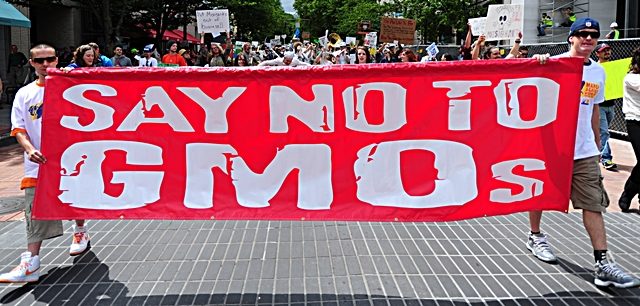State senator: GMO labeling ‘a marketing ploy’ by organics industry

PROTEST OR CLEVER MARKETING CAMPAIGN?: A state senator in Vermont says GMO labeling laws are “a ploy” to boost the sale of organic food products.
By Bruce Parker | Vermont Watchdog
A Vermont state senator who voted against labeling foods containing GMOs says the push to label genetically modified food is about boosting sales of organic foods.
“This is a marketing ploy by the organics industry so they could get a bigger share of the market. If you scare people about what they’re eating, they’re going to change,” state Sen. Norm McAllister, R-Franklin, told Vermont Watchdog.
McAllister said GMO labeling advocates stand to see a 15 percent gain in market share as a result of mandatory labeling. McAllister’s comments come as Vermont’s attorney general late last week asked a U.S. district court judge to dismiss a lawsuit against Act 120, the state’s new GMO labeling law.
Labels for sweet corn and seedless grapes? Bruce Parker explains the questions behind Vermont’s GMO labels.
http://watchdog.org/wp-content/blogs.dir/1/files/2014/08/GMO-labels.-Fraud-or-marketing-plan.mp3
Vermont Attorney General William Sorrell last Thursday urged a U.S. District Court to reject a lawsuit filed in June by the Grocery Manufacturers Association and three other trade groups.
“The state’s motion makes the case that Vermont’s labeling law withstands all five challenges to its constitutionality made by Plaintiffs and that the Court should dismiss the suit without requiring the State to answer the Complaint or engage in further litigation,” Sorrell said in the legal filing.
The food manufacturers, the plaintiffs in the case, argue that states can’t force businesses to label foods or convey an opinion they don’t hold without first demonstrating a product is harmful.
McAllister, one of the few lawmakers to oppose the bill, said the attorney general publicly doubted the state can successfully defend Act 120.
“What we were told … is you can’t compel somebody to say something if there’s nothing wrong. There’s never been proven anything wrong with this technology they use in the seed — so it’s considered consumer curiosity. That’s what Sorrell told us,” McAllister said.
The lawmaker claims the attorney general’s opinion on the law’s defensibility was “a big reason” he opposed the bill.
The lawsuit could cost Vermont taxpayers millions.
To defend the law, the Legislature created Food Fight Fund Vermont, a legal defense fund that so far has raised more than $150,000 of a $1.5 million target. Although the fund takes in public donations, the main portion of the $1.5 million will come from settlement money collected by the Office of the Attorney General that exceed the estimated amount of settlement proceeds in the July 2014 revenue forecast.
The state is paying $1.46 million to Washington, D.C., law firm Robbins Russell to lead the defense during the first phase of litigation. If Vermont loses its case, taxpayers could be on the hook for as much as $8 million.
Two anti-GMO special interest groups, Vermont Public Interest Research Group and the Center for Food Safety, are seeking to become parties of the lawsuit. Sorrell is supporting the groups in hopes they might “contribute to the arguments presented to this Court,” the AG said in the filing.
The plaintiffs argue VPIRG’s motion to intervene should be denied because of a lack of a “direct, substantial, and legally protectable interest” in the case.
McAllister said the use of Vermont’s legal system to support special interest groups was appalling.
“Whoever comes along with the most money can buy whatever they want,” he said. “We put our legal system up for sale. If you have an advocacy thing, we’ll just let you start up a fund and let people donate to it. And we’ll let the state fight it for you with tax dollars. It’s disgusting.”
McAllister, a member of the Senate Committee on Agriculture, added the anti-GMO movement can’t legally ban GMOs, and therefore is seeking a backdoor method of accomplishing the same goal.
“They tried an outright ban, but you can’t do that — it’s nowhere near constitutional. Then they did labeling of seeds, but nobody paid attention to that,” he said. “So what do you do next to scare the public and the consumer? How do you get them to think your form of food is the only way to go? You scare them about what they are eating. You tell them all these dreadful things that could be — anything you can dream up.”
In fact, prominent organic activists recently claimed GMOs are causing thousands of deaths.
“What does this really do? This scares people who don’t understand it, and they will want to go buy organic. And organic gains,” McAllister said.
“The governor wanted this, and the Senate pro-tem wanted this — so it was going to happen. It didn’t matter what it was going to cost the people of the state. It didn’t matter the outcome. We’re making a statement with the public’s money. There’s a lot of things we could have done for the money we’re going to waste on this one.”
Contact Bruce Parker at bparker@watchdog.org







